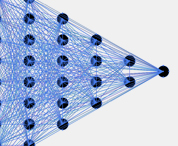For his PhD from the Hebrew University Department of Ecology, Evolution, and Behavior, Dr. Moshe Zaguri empirically tested a new conceptual framework, the Defense Physiology Theory (DPT), in the context of a food chain that includes the Israeli desert isopod (a crustacean) and its main predator scorpion. Dr. Zaguri revealed that isopods responded to the threat of predation in ways that were largely consistent with DPT, experiencing physiological changes such as increased metabolic rate, changes in body composition, and modified nutritional preferences towards more carbohydrate-rich resources. He showed that these physiological changes in prey cascaded to alter the surrounding soil surface crust’s elemental composition, in addition to setting in motion processes that led to a change in the surrounding plants’ carbon/nitrogen ratio.
For his postdoc at the Cornell University College of Agriculture and Life Sciences, Dr. Zaguri is experimenting with pollinator bees to determine how their response to predation threat affects their physiology and pollination patterns, and how those, in turn, affect the reproductive success of the plant communities that they pollinate. He is constructing complex mesocosms–outdoor experimental systems to examine the natural environment under controlled conditions–and conducting a meta-analysis to integrate his findings with existing literature.
Pollinator bees typically feed on carbohydrate-rich nectar and protein-rich pollen. When bees experience predator threat, Dr. Zaguri expects to see a shift in their nutritional requirements towards more carbohydrate-rich resources and a subsequent preference to visit flowers that provide more nectar and less pollen. These predator-induced foraging alterations may affect pollen uptake and deposition and alter plant fitness. Previous studies have tested behavioral responses of pollinators to different predation risks, but none have examined bees’ physiological responses, which can elucidate the processes underlying their behavioral responses to threats and can affect the practical measures humans take to enhance pollination.
Pollination is a key ecosystem process that facilitates plant regeneration and is also vital to agricultural production. There is clear evidence of recent declines in wild and domesticated pollinators, and parallel declines in the plants that rely upon them. Dr. Zaguri hopes his research could ultimately aid in conservation efforts to stop global declines of pollinators and boost sustainable agriculture.
 ISRAELI COUNCIL FOR HIGHER EDUCATION
ISRAELI COUNCIL FOR HIGHER EDUCATION MIT-Israel Zuckerman STEM Fund for Faculty Collaboration
MIT-Israel Zuckerman STEM Fund for Faculty Collaboration The Zuckerman Travel and Research STEM Fund at Harvard
The Zuckerman Travel and Research STEM Fund at Harvard Zuckerman AI Fund at Technion
Zuckerman AI Fund at Technion Alan Alda Communicating Science
Alan Alda Communicating Science Zuckerman Institute – ScienceAbroad
Zuckerman Institute – ScienceAbroad Zuckerman Institute – America-Israel Friendship League partnership
Zuckerman Institute – America-Israel Friendship League partnership


























